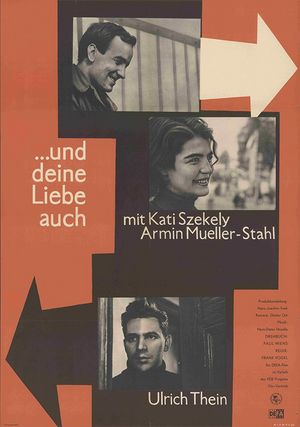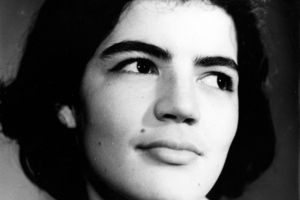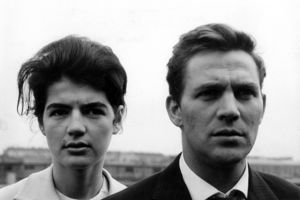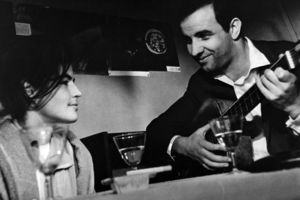... und deine Liebe auch
Regie: Frank Vogel, 92 Min., Schwarz-Weiß, Spielfilm
Deutsche Demokratische Republik (DDR)
DEFA-Studio für Spielfilme, 1962
- Film-/Videoformat
- 35 mm
- Länge in m
- 2515
- Sonstiger Titel
- Bei uns; Melancholie
- Englischer Titel
- And Your Love Too
- Premierendatum
- Anlaufdatum

(R: Frank Vogel, 1962) Grafiker: Werner Klemke
Kurzinhalt (Deutsch)
Elektromonteur Ulli und Taxifahrer Klaus wuchsen wie Brüder bei Klaus’ Mutter auf, nachdem Ulli in Folge des Zweiten Weltkriegs elternlos war. 1961 sind die Weltbilder der beiden Männer gänzlich verschieden. Klaus, ein Lebemensch, tauscht sein in West-Berlin verdientes Geld 1:4 und lebt in Saus und Braus. Am 13. August ist es Ulli, der ihm im Zuge des Mauerbaus den Weg in den Westen versperrt. Im Gegensatz zu Klaus befürwortet er die Schließung der Grenzen. Beide Männer lieben die Postbotin Eva, die sich für den erfolgsverwöhnten Klaus zu entscheiden scheint…

(R: Frank Vogel, 1962) Fotograf: Hans-Joachim Zillmer

(R: Frank Vogel, 1962) Fotograf: Hans-Joachim Zillmer
Filmstab
- Regie
-
- Frank Vogel
- Drehbuch
-
- Paul Wiens
- Kamera
- Schnitt
-
- Ella Ensink-Kleberg
- Darsteller
-
- Kati Székely (Eva)
- Armin Mueller-Stahl (Ulli)
- Ulrich Thein (Klaus)
- Katharina Lind (Margot)
- Alfonso Arau (Alfredo)
- Maria Besendahl (Wirtin)
- Marita Böhme (Fürsorgerin)
- Doris Thalmer (Nachbarin)
- Gisela Strauss (Betriebsredakteurin)
- Bertina Acewedo (Kubanische Begleiterin)
- Regieassistenz
-
- Helgard Mühlberg
- Kameraassistenz
-
- Dietram Kleist
- Szenenbild
-
- Werner Zieschang
- Dramaturgie
-
- Willi Brückner
- Musik
-
- Hans-Dieter Hosalla
- Ton
-
- Horst Mathuschek
- Kostüm
-
- Werner Bergemann
- Requisite
-
- Adolf Kilian
- Produktionsleitung
-
- Hans-Joachim Funk
- Aufnahmeleitung
-
- Irene Ikker
- DEFA-Fotograf
-
- Hans-Joachim (auch: Jochen) Zillmer
Auszeichnungen
- Heinrich-Greif-Preis I. Klasse (1963): Heinrich-Greif-Preis I.Klasse - Frank Vogel
- Heinrich-Greif-Preis I. Klasse (1963): Heinrich-Greif-Preis I.Klasse - Willi Brückner
- Heinrich-Greif-Preis I. Klasse (1963): Heinrich-Greif-Preis I.Klasse - Günter Ost
- Heinrich-Greif-Preis I. Klasse (1963): Heinrich-Greif-Preis I.Klasse - Hans-Dieter Hosalla
Kurzinhalt (Englisch)
Electrician Ulli and taxi driver Klaus grew up like brothers at Klaus' mother's house after Ulli became an orphan as a result of World War II. In 1961, the worldviews of the two men are completely different. Klaus, a hedonist, exchanges his money earned in West Berlin at a 1:4 rate and lives a life of luxury. On August 13, it is Ulli who blocks his way to the West during the construction of the Berlin Wall. In contrast to Klaus, he supports the closure of the borders. Both men are in love with the mailwoman Eva, who seems to choose the successful Klaus...
Kurzinhalt (Weitere Sprachen)
Eva è contesa da Ulli e Klaus, due fratelli, figli di operai, molto diversi tra loro. Mentre Klaus è per una vita spensierate e per i soldi facili, che si guadagna lavorando come tassista all'ovest, Ulli è un ragazzo serio, timido con chiare posizioni politiche. Il 13 agosto del 1961 a Klaus viene impedito di recarsi all'ovest - ad attenderlo al confine suo fratello Ulli, con un arma in mano. Eva si lascia conquistare dall'arrogante Klaus, ma quando gli comunica di essere incinta, lui si sottrae alle sue responsabilità. Eva capisce di non amarlo veramente e di preferire Ulli. Quando Klaus, arrestato durante un tentativo di fuga, viene rinchiuso in prigione, la ragazza è costretta a decidersi. (Italienisch)Thành phố Berlin, mùa hè 1961. Hai anh em cùng cha khác mẹ và có cá tính khác hẳn nhau, Klaus và Ulli, cùng yêu say đắm Eva, một cô gái xinh đẹp. Klaus là một người say mê và có lối sống bạt mạng, thu nhập khá tốt từ nghề lái taxi tại Tây Berlin. Còn Ulli, một người ưu tư và sống thu mình hơn, làm việc tại Đông Berlin trong một nhà máy sản xuất bóng điện. Thoạt tiên Eva ngả về Klaus, người hứa sẽ cho cô một cuộc sống vui vẻ và không phải lo lắng chuyện tiền bạc. Tuy nhiên vào ngày 13 tháng 8 năm 1961, khi bức tường Berlin được dựng lên và Klaus không còn được sang Tây Berlin nữa, còn Ulli là người cầm súng canh giữ bức tường, thì Eva đã phải quyết định lựa chọn ai trong hai anh em.„Kể cả tình yêu“ là bộ phim đầu tiên của Cộng hòa Dân chủ Đức về đề tài bức tường Berlin. Nhờ việc dựng lại tinh tế cảm xúc của người dân Berlin vào mùa hè 1961 trước khi xuất hiện bức tường, bộ phim đã gây được ấn tượng sâu cho người xem. (Vietnamesisch)



